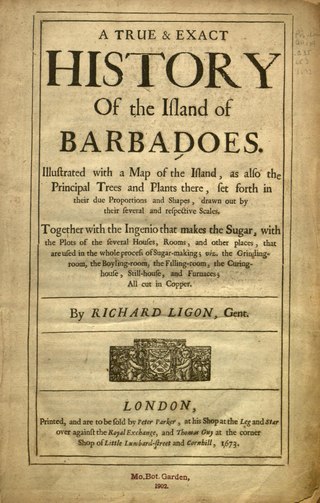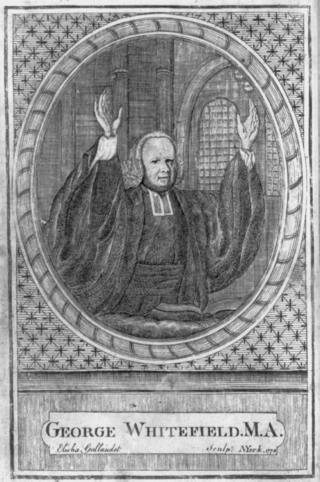Related Research Articles
Methodism, also called the Methodist movement, is a group of historically related denominations of Protestant Christianity whose origins, doctrine and practice derive from the life and teachings of John Wesley. George Whitefield and John's brother Charles Wesley were also significant early leaders in the movement. They were named Methodists for "the methodical way in which they carried out their Christian faith". Methodism originated as a revival movement within Anglicanism originating out of the Church of England in the 18th century and became a separate denomination after Wesley's death. The movement spread throughout the British Empire, the United States, and beyond because of vigorous missionary work, and today has about 80 million adherents worldwide.

A missionary is a member of a religious group which is sent into an area in order to promote its faith or provide services to people, such as education, literacy, social justice, health care, and economic development.
Robert Haldane was a religious writer and Scottish theologian. Author of Commentaire sur l'Épître aux Romains, On the Inspiration of Scripture and Exposition of the Epistle to the Romans.
A Christian mission is an organized effort for the propagation of the Christian faith. Missions involve sending individuals and groups across boundaries, most commonly geographical boundaries, to carry on evangelism or other activities, such as educational or hospital work. Sometimes individuals are sent and are called missionaries, and historically may have been based in mission stations. When groups are sent, they are often called mission teams and they do mission trips. There are a few different kinds of mission trips: short-term, long-term, relational and those that simply help people in need. Some people choose to dedicate their whole lives to mission. Missionaries preach the Christian faith, and provide humanitarian aid. Christian doctrines permit the provision of aid without requiring religious conversion. However, Christian missionaries are implicated in the genocide of indigenous peoples. Around 100,000 native people in California, U.S., or 1/3 of the native population, are said to have died due to missions.

The African Methodist Episcopal Zion Church, or the AME Zion Church (AMEZ) is a historically African-American Christian denomination based in the United States. It was officially formed in 1821 in New York City, but operated for a number of years before then. The African Methodist Episcopal Zion Church adheres to Wesleyan-Arminian theology.

Christian views on slavery are varied regionally, historically and spiritually. Slavery in various forms has been a part of the social environment for much of Christianity's history, spanning well over eighteen centuries. In the early years of Christianity, slavery was an established feature of the economy and society in the Roman Empire, and this persisted in different forms and with regional differences well into the Middle Ages. Saint Augustine described slavery as being against God's intention and resulting from sin. In the eighteenth century the abolition movement took shape among Christians across the globe.

Francis Makemie (1658–1708) was an Ulster Scots clergyman, considered to be the founder of Presbyterianism in the United States of America.

Samuel Crowther, was a Yoruba linguist, clergyman, and the first African Anglican bishop of West Africa. Born in Osogun, he and his family were captured by slave raiders when he was about twelve years old. This took place during the Yoruba civil wars, notably the Owu wars of 1821–1829, where his village Osogun was ransacked. Ajayi was later on resold to Portuguese slave dealers, where he was put on board to be transported to the New World through the Atlantic.

The London Missionary Society was an interdenominational evangelical missionary society formed in England in 1795 at the instigation of Welsh Congregationalist minister Edward Williams. It was largely Reformed in outlook, with Congregational missions in Oceania, Africa, and the Americas, although there were also Presbyterians, Methodists, Baptists, and various other Protestants involved. It now forms part of the Council for World Mission.
Sarah Ann Gill was a social and religious leader in Barbados during the era of slavery. By an act of the Barbadian Parliament in 1998, she was named a National Hero of Barbados.

Richard Ligon (1585?–1662), an English author, lost his fortune as a royalist during the English Civil War (1642-1651), and during this turbulent time in England he found himself, as he notes in his narrative, a "stranger in my own country.” On 14 June 1647, he left for Barbados to gain his fortune in the New World, like many of his fellow countrymen. Ligon purchased half of a sugar plantation in Barbados. After two years residence on the island he was attacked by a fever, and returned to England in 1650. He was soon afterward put into prison by his creditors. There are conflicting reports as to whether his narrative was conceived of in prison as a way to pay off his creditors and gain his freedom, or before his imprisonment at the urging of Brian Duppa, Bishop of Salisbury. His work, a folio with maps and illustrations, is entitled A True and Exact History of the Island of Barbados and was published in London in 1657 and again in 1673.

Selina Hastings, Countess of Huntingdon was an English religious leader who played a prominent part in the religious revival of the 18th century and the Methodist movement in England and Wales. She founded an evangelical branch in England and Sierra Leone, known as the Countess of Huntingdon's Connexion.
William Jowett was a missionary and author, in 1813 becoming the first Anglican cleric to volunteer for the overseas service of the Church Missionary Society. A leader of the Evangelicals at Cambridge, he worked in Malta, Syria, and Palestine, and in later life was clerical secretary of the Society and a parish priest in Clapham, South London.

Christianity in the 18th century is marked by the First Great Awakening in the Americas, along with the expansion of the Spanish and Portuguese empires around the world, which helped to spread Catholicism.
Characteristic of Christianity in the 19th century were evangelical revivals in some largely Protestant countries and later the effects of modern biblical scholarship on the churches. Liberal or modernist theology was one consequence of this. In Europe, the Roman Catholic Church strongly opposed liberalism and culture wars launched in Germany, Italy, Belgium and France. It strongly emphasized personal piety. In Europe there was a general move away from religious observance and belief in Christian teachings and a move towards secularism. In Protestantism, pietistic revivals were common.

Thomas Birch Freeman was an Anglo-African Wesleyan minister, missionary, botanist and colonial official in West Africa. He is widely regarded as a pioneer of the Methodist Church in colonial West Africa, where he also established multiple schools. Some scholars view him as the "Founder of Ghana Methodism". Freeman's missionary activities took him to Dahomey, now Benin as well as to Western Nigeria.
James George Barbadoes was an African-American, community leader, and abolitionist in Boston, Massachusetts in the early 19th century. Dedicated to improving the lives of people of color at the local level, as well as the national level.

Henry William Coulthurst (1753–1817) was an English cleric and academic.
References
- ↑ Beckles, Hilary McD (2006). A history of Barbados : from Amerindian settlement to Caribbean single market (2nd ed.). Cambridge [England]: Cambridge University Press. p. 118. ISBN 978-0-521-67849-0.
- ↑ "EXPULSION OF MR. SHREWSBURY, THE MISSIONARY, FROM BARBADOES. (Hansard, 23 June 1825)".
- ↑ "The Barbados Advocate - Methodist Church's annual lecture focuses on Shrewsbury's impact". www.barbadosadvocate.com. Archived from the original on 2015-02-07.
- ↑ Formats and Editions of Christian thoughts on free trade : in a letter to Thomas, David & Peter Whitehead ... [WorldCat.org]. OCLC. OCLC 65313273 . Retrieved 1 March 2019– via www.worldcat.org.